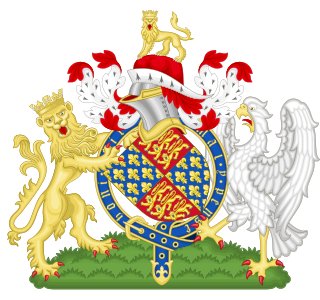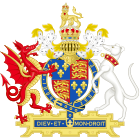
The House of Tudor was an English and Welsh dynasty that held the throne of England from 1485 to 1603. They descended from the Tudors of Penmynydd, a Welsh noble family, and Catherine of Valois. The Tudor monarchs ruled the Kingdom of England and the Lordship of Ireland for 118 years with five monarchs: Henry VII, Henry VIII, Edward VI, Mary I and Elizabeth I. The Tudors succeeded the House of Plantagenet as rulers of the Kingdom of England, and were succeeded by the Scottish House of Stuart. The first Tudor monarch, Henry VII, descended through his mother from the House of Beaufort, a legitimised branch of the English royal House of Lancaster, a cadet house of the Plantagenets. The Tudor family rose to power and started the Tudor period in the wake of the Wars of the Roses (1455–1487), which left the main House of Lancaster extinct in the male line.

Edward Seymour, 1st Duke of Somerset, 1st Earl of Hertford, 1st Viscount Beauchamp, also known as Edward Semel, was an English nobleman and politician who served as Lord Protector of England from 1547 to 1549 during the minority of his nephew King Edward VI. He was the eldest surviving brother of Queen Jane Seymour, the third wife of King Henry VIII.

John Dudley, 1st Duke of Northumberland was an English general, admiral, and politician, who led the government of the young King Edward VI from 1550 until 1553, and unsuccessfully tried to install Lady Jane Grey on the English throne after the King's death. The son of Edmund Dudley, a minister of Henry VII executed by Henry VIII, John Dudley became the ward of Sir Edward Guildford at the age of seven. Dudley grew up in Guildford's household together with his future wife, Guildford's daughter Jane, with whom he was to have 13 children. Dudley served as Vice-Admiral and Lord Admiral from 1537 until 1547, during which time he set novel standards of navy organisation and was an innovative commander at sea. He also developed a strong interest in overseas exploration. Dudley took part in the 1544 campaigns in Scotland and France and was one of Henry VIII's intimates in the last years of the reign. He was also a leader of the religious reform party at court.

The English Poor Laws were a system of poor relief in England and Wales that developed out of the codification of late-medieval and Tudor-era laws in 1587–1598. The system continued until the modern welfare state emerged after the Second World War.
The Black Codes, sometimes called the Black Laws, were laws which governed the conduct of African Americans. In 1832, James Kent wrote that "in most of the United States, there is a distinction in respect to political privileges, between free white persons and free colored persons of African blood; and in no part of the country do the latter, in point of fact, participate equally with the whites, in the exercise of civil and political rights." Although Black Codes existed before the Civil War and although many Northern states had them, the Southern U.S. states codified such laws in everyday practice. The best known of these laws were passed by Southern states in 1865 and 1866, after the Civil War, in order to restrict African Americans' freedom, and in order to compel them to work for either low or no wages.

A Caveat or Warning for Common Cursitors, vulgarly called vagabonds was first published in 1566 by Thomas Harman, and although no copies of that edition survive, it must have been popular, because two printers were punished by the Stationers' Company in 1567 for pirated editions. Two editions were published in 1568, and a revised edition in 1573. It is one of the fundamental texts for rogue literature.

The act 7 Ric. 2. c. 5 (1383), sometimes called the Beggars Act 1383, the Vagrancy Act, or the Vagabonds Act 1383, was an act of the Parliament of England made at Westminster in 1383, after the Peasants' Revolt (1381).

In English and British history, poor relief refers to government and ecclesiastical action to relieve poverty. Over the centuries, various authorities have needed to decide whose poverty deserves relief and also who should bear the cost of helping the poor. Alongside ever-changing attitudes towards poverty, many methods have been attempted to answer these questions. Since the early 16th century legislation on poverty enacted by the Parliament of England, poor relief has developed from being little more than a systematic means of punishment into a complex system of government-funded support and protection, especially following the creation in the 1940s of the welfare state.

The Vagabonds Act 1597 was an Act of the Parliament of England, which aimed to address concerns of vagrancy.

Vagrancy is the condition of wandering homelessness without regular employment or income. Vagrants usually live in poverty and support themselves by travelling while engaging in begging, scavenging, petty theft, temporary work, or social security. Historically, vagrancy in Western societies was associated with petty crime, begging and lawlessness, and punishable by law with forced labor, military service, imprisonment, or confinement to dedicated labor houses.

The Vagrancy Act 1824 is an Act of Parliament of the United Kingdom that makes it an offence to sleep rough or beg in England and Wales. The legislation was passed in Georgian England to combat the increasing number of people forced to live on the streets due to the conclusion of the Napoleonic Wars and the social effects of the Industrial Revolution. Critics of the law included politician and abolitionist, William Wilberforce, who condemned the Act for making it a catch-all offence for vagrancy with no consideration of the circumstances as to why an individual might be homeless.
The Tudor poor laws were the laws regarding poor relief in the Kingdom of England around the time of the Tudor period (1485–1603). The Tudor Poor Laws ended with the passing of the Elizabethan Poor Law in 1601, two years before the end of the Tudor dynasty, a piece of legislation which codified the previous Tudor legislation.
Vagabonds Act may refer to:

Slavery in South Africa existed from 1653 in the Dutch Cape Colony until the abolition of slavery in the British Cape Colony on 1 January 1834. This followed the British banning the trade of slaves between colonies in 1807, with their emancipation by 1834. Beyond legal abolition, slavery continued in the Transvaal though a system of inboekstelsel.

The Vagabonds Act 1530 was an act passed under Henry VIII and is a part of the Tudor Poor Laws of England. In full, it was entitled "An Act directing how aged, poor and impotent Persons, compelled to live by Alms, shall be ordered; and how Vagabonds and Beggars shall be punished."

The Act for Punishment of Sturdy Vagabonds and Beggars was an act passed in Tudor England by Henry VIII. It is part of the Tudor Poor Laws. It was the earliest English Poor Law to provide for structured collections for the poor.

The Act for the Provision and Relief of the Poor was a statute passed by the Parliament of England during the reign of King Edward VI. It is a part of the Tudor Poor Laws and reaffirms previous poor laws enacted in 1536, 1547, and 1549 which focused primarily on the punishment of vagabonds. The Poor Act 1551 designated a new position, "collector of alms," in each parish. Local authorities and residents elected two alms collectors to request, record, and distribute charitable donations for poor relief. It further provided that each parish would keep a register of all its “impotent, aged, and needy persons” and the aid they received. Parish authorities were directed to “gently exhort” any person that could contribute but would not, referring them to the Bishop of the Diocese if they continued to refuse. Punishment for neglecting poor relief obligations was adopted in 1563 and reliance on charity was replaced by a system of taxation in 1597. Under the assumption that all poor would be cared for, begging openly was now forbidden. Licensed begging would be reinstated by the Marian Parliament of 1555 with the requirement that legal beggars wear badges.

The Vagabonds Act 1572 or the Vagabonds, etc. Act 1572 was a law passed in England under Queen Elizabeth I. It is a part of the Tudor Poor Laws and a predecessor to the Elizabethan Poor Laws.

The Vagrancy Act 1898 was a piece of legislation in England and Wales that criminalised men who lived off the earnings of prostitution (pimping) and who solicited in public places. The bill was generally viewed as successful in its impact, leading to the similar Immoral Traffic (Scotland) Act.

The Egyptians Act 1554 is a piece of 16th-century English legislation regarding Romani and travelers within the realm. The act was passed to amend previous laws regarding the Romani people. The Egyptians Act 1530 did not cover Gypsies who were born in England or those who came to England by way of Scotland.
















